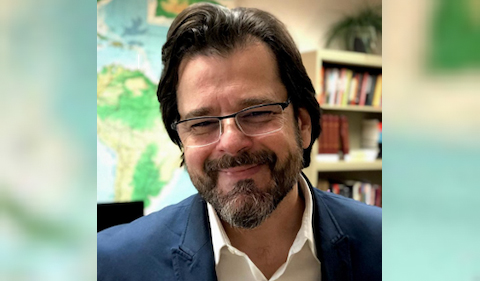Dr. Patrick Barr-Melej, Professor of History and Interim Executive Director of the Center for International Studies, was interviewed by the Chilean music magazine Rockaxis for a recent special edition on rock music and Chilean musical icon Víctor Jara.
Jara, who was murdered by the emergent military regime of Gen. Augusto Pinochet in 1973, was a revolutionary activist and key figure in Chile’s Nueva Canción (New Song) movement, known for its strongly folkloric rhythms and lyrics that spoke of and to the working class and poor. While remembered and still celebrated internationally for his folk music and Marxist credentials, Jara’s musical tastes and friendships were more complex than many assume today, Barr-Melej explains in Rockaxis.
Barr-Melej’s most recent book, Psychedelic Chile: Youth, Counterculture, and Politics on the Road to Socialism and Dictatorship (2017), which delves into rock music and its implications in during the government of Marxist President Salvador Allende (1970-73), notes Jara’s passion for rock music—a genre that his fellow Marxists tended to reject outright as bourgeois, imperialist, and culturally empty.
Despite such criticism, Jara’s admiration for rock and friendships with some important rock musicians (who Marxists openly berated) led to collaborative recordings, including the 1971 album, El Derecho de Vivir en Paz (The Right to Live in Peace), on which Jara teamed up with the Chilean rock band Los Blops.
“Jara was a gifted and dedicated artist, and his revolutionary politics were closely aligned with Allende’s,” Barr-Melej described. “But Jara’s ties to some significant rock musicians and his enjoyment of rock speak to the importance of taste and friendship, which can transcend powerful boundaries and expectations that are essentially political and ideological.”
Psychedelic Chile has drawn considerable attention and acclaim in Chile. In 2017, for instance, the work was named a “Book to Highlight” by the large Santiago newspaper La Tercera. In 2020, Barr-Melej was an invited guest (virtually) at the Allende Foundation in Santiago, where he presented on youth culture and politics during the Allende years in an event marking the 50th anniversary of Allende’s victory in Chile’s 1970 presidential election.



















One Comment